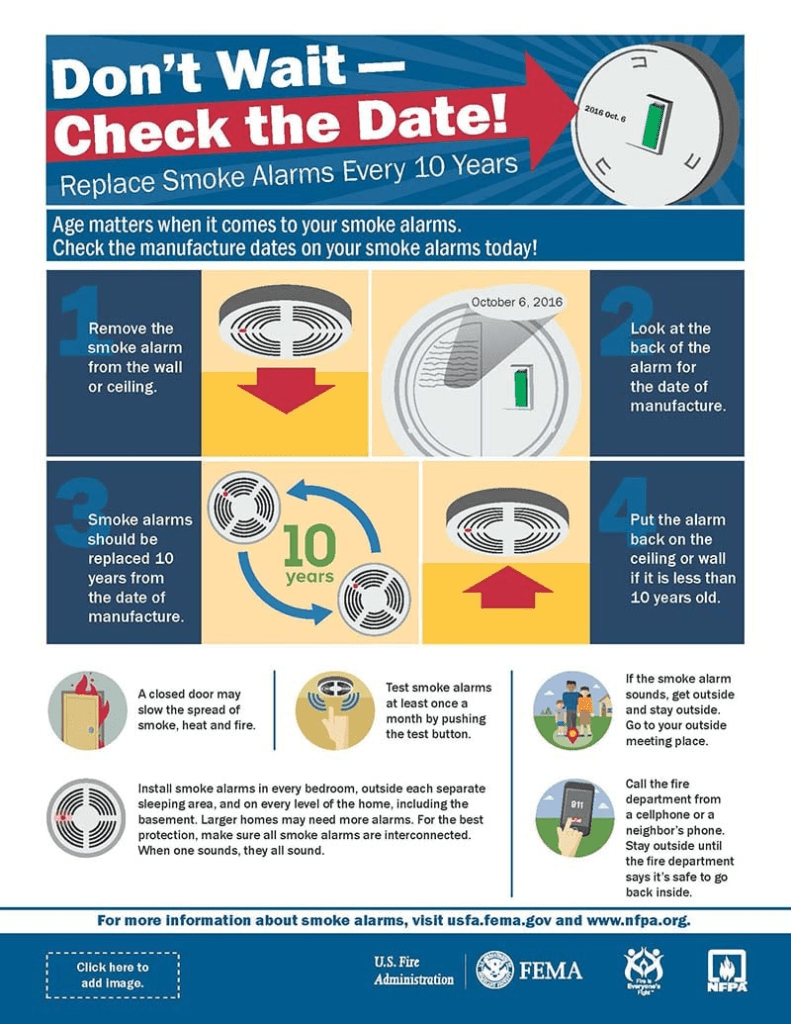When You Should Change Batteries in Your Smoke Detector
The smoke detector is one of the most important tools we own. It keeps our families, pets, and home safe. We notice it when it’s chirping because of a low battery, or when it goes off because we went a little overboard in the kitchen, but oftentimes we take it for granted. We assume it will work when we need it to. But with three out of five house fire deaths occurring in homes without working smoke alarms, it’s clear that’s not always the case.
Half of all house fires happen between 11pm and 7am, when we depend on smoke detectors the most. So it just makes sense that we would want to do everything we can to keep our smoke detectors running optimally, including keeping our smoke detector battery charged.
Change The Batteries!
The U.S. Fire Administration recommends changing your smoke detector batteries every six months, unless your detector is hard-wired into your electrical system, in which case you should change the batteries yearly. It is widely suggested that you change the batteries when the clocks “spring forward” or “fall back.”
This might seem excessive given the lifespan of modern batteries. Yes — your batteries will probably last longer than that, but there are a variety of reasons you should still follow this schedule:
- It’s conservative for a reason! This device exists to save the lives of you and your family. If your batteries still have some juice in them, you can still use them — just not in a device this important.
- Some smoke detectors pull more power than you would think, particularly if they go off often when you’re cooking.
- Following a schedule can keep you from forgetting to do it altogether.
- Waiting until you hear the chirping, which indicates that the batteries are low, can often be disastrous. A smoke detector battery requires a lot of juice to sound a loud alarm, and keep on sounding that alarm for as long as it’s needed! If your batteries are at the end of their lives, you could end up with a weak alarm that doesn’t do its job well enough.
Test Your Smoke Detector Regularly
In addition to changing your smoke detector batteries, it is essential to test the unit monthly. This is accomplished by pressing the test button until the alarm begins to sound. You should position someone at the end of your home furthest from the alarm to ensure it is loud enough to be heard everywhere. Just because it’s deafeningly loud close up doesn’t mean it’s that loud everywhere!
It is recommended that you install smoke detectors throughout your home — at a minimum, one in each bedroom, and on each floor. This way, if a fire starts up at night, you don’t run the risk of anyone sleeping through the alarm.
According to the U.S. Fire Administration, you should adhere to the following guidelines, depending on what type of smoke detector you have:
- Test all smoke detectors monthly
- Replace batteries every six months, or annually if hard-wired into your electrical system
- If you have a ten-year lithium-powered smoke detector, you cannot change the battery, but keep up on your testing schedule, as lithium batteries lose power VERY quickly at the end of their lives (this should be around the ten-year mark)
- Replace all smoke detectors every ten years
How to Replace the Batteries
First thing’s first — remember to check what type of battery you need before you head to the store! Smoke detector batteries are generally 9-volt or AA. Next, there are a couple of important things to note before you head out:
- Don’t buy rechargeable batteries. This might seem like a good idea, but they lose their charge quickly, and shouldn’t be used for a life-or-death appliance.
- Don’t buy lithium batteries. While they have a longer lifespan, they also lose their charge much more rapidly when they do lose it, which means that the battery life can plummet all at once, leaving you in the lurch.
- Buy the brand name batteries. In the same way that you want to replace the battery every six months to ensure its quality, you want a good battery in there from the start.
Replacing the batteries is a relatively simple three-step process.
1. Remove the body or cover. Most smoke detectors have a cover that hinges down or lifts off, or the entire body is clipped onto a base that is attached to the wall or ceiling. You’ll want to pry the cover open or unclip the body of the smoke detector from its base with a counterclockwise twisting motion.
2. Replace the battery. Make sure that the male and female ends of the battery are properly connected to the base.
3. Close the cover or replace the body.
After replacing the batteries, make sure to immediately test the smoke detector! You want to make sure you did everything correctly, and that the batteries aren’t duds.
Some Final Notes
We hope you take these instructions to heart. Fires can be devastating, and house fires kill an average of 8 people per day in the United States alone. Knowing that a simple appliance with basic upkeep could save the lives of you and your loved ones, the choice to keep up with it should be a no brainer.

Of course, not all disasters can be avoided, and if you have experienced fire damage, we would love to help get you back to normal. We are available 24/7, and can help with any fire damage restoration needs you may have.
Resources:
http://www.usfa.fema.gov/prevention/outreach/smoke_alarms.html
https://www.frameworkhomeownership.org/blog/change-your-smoke-alarm-batteries

